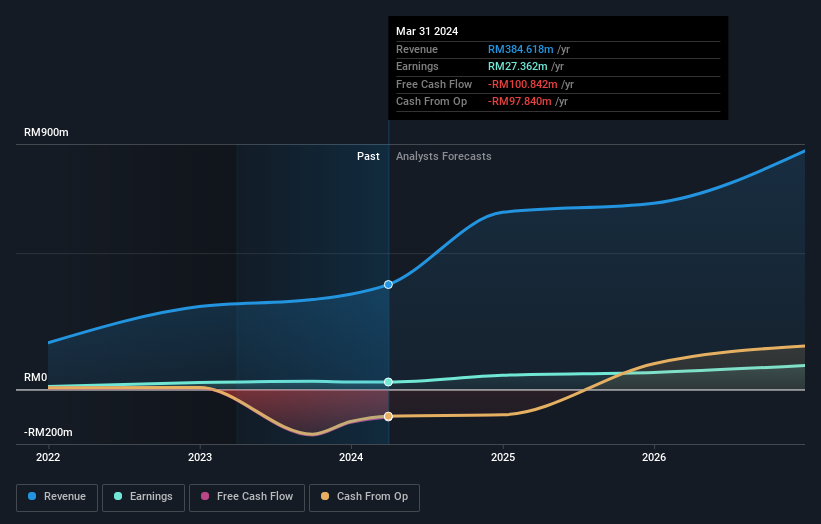- Malaysia
- /
- Construction
- /
- KLSE:VLB
Vestland Berhad's (KLSE:VLB) CEO Foo Heen Liew is the most upbeat insider, and their holdings increased by 16% last week

Key Insights
- Insiders appear to have a vested interest in Vestland Berhad's growth, as seen by their sizeable ownership
- Foo Heen Liew owns 60% of the company
- Ownership research, combined with past performance data can help provide a good understanding of opportunities in a stock
If you want to know who really controls Vestland Berhad (KLSE:VLB), then you'll have to look at the makeup of its share registry. And the group that holds the biggest piece of the pie are individual insiders with 78% ownership. That is, the group stands to benefit the most if the stock rises (or lose the most if there is a downturn).
As a result, insiders were the biggest beneficiaries of last week’s 16% gain.
In the chart below, we zoom in on the different ownership groups of Vestland Berhad.
Check out our latest analysis for Vestland Berhad

What Does The Institutional Ownership Tell Us About Vestland Berhad?
Institutions typically measure themselves against a benchmark when reporting to their own investors, so they often become more enthusiastic about a stock once it's included in a major index. We would expect most companies to have some institutions on the register, especially if they are growing.
Institutions have a very small stake in Vestland Berhad. That indicates that the company is on the radar of some funds, but it isn't particularly popular with professional investors at the moment. If the company is growing earnings, that may indicate that it is just beginning to catch the attention of these deep-pocketed investors. When multiple institutional investors want to buy shares, we often see a rising share price. The past revenue trajectory (shown below) can be an indication of future growth, but there are no guarantees.

Hedge funds don't have many shares in Vestland Berhad. With a 60% stake, CEO Foo Heen Liew is the largest shareholder. This essentially means that they have significant control over the outcome or future of the company, which is why insider ownership is usually looked upon favourably by prospective buyers. For context, the second largest shareholder holds about 11% of the shares outstanding, followed by an ownership of 1.7% by the third-largest shareholder. Interestingly, the second-largest shareholder, Sai Wong is also Senior Key Executive, again, pointing towards strong insider ownership amongst the company's top shareholders.
Researching institutional ownership is a good way to gauge and filter a stock's expected performance. The same can be achieved by studying analyst sentiments. While there is some analyst coverage, the company is probably not widely covered. So it could gain more attention, down the track.
Insider Ownership Of Vestland Berhad
While the precise definition of an insider can be subjective, almost everyone considers board members to be insiders. Company management run the business, but the CEO will answer to the board, even if he or she is a member of it.
Insider ownership is positive when it signals leadership are thinking like the true owners of the company. However, high insider ownership can also give immense power to a small group within the company. This can be negative in some circumstances.
It seems that insiders own more than half the Vestland Berhad stock. This gives them a lot of power. So they have a RM376m stake in this RM482m business. Most would argue this is a positive, showing strong alignment with shareholders. You can click here to see if those insiders have been buying or selling.
General Public Ownership
With a 18% ownership, the general public, mostly comprising of individual investors, have some degree of sway over Vestland Berhad. While this size of ownership may not be enough to sway a policy decision in their favour, they can still make a collective impact on company policies.
Next Steps:
While it is well worth considering the different groups that own a company, there are other factors that are even more important. Consider risks, for instance. Every company has them, and we've spotted 2 warning signs for Vestland Berhad you should know about.
But ultimately it is the future, not the past, that will determine how well the owners of this business will do. Therefore we think it advisable to take a look at this free report showing whether analysts are predicting a brighter future.
NB: Figures in this article are calculated using data from the last twelve months, which refer to the 12-month period ending on the last date of the month the financial statement is dated. This may not be consistent with full year annual report figures.
New: Manage All Your Stock Portfolios in One Place
We've created the ultimate portfolio companion for stock investors, and it's free.
• Connect an unlimited number of Portfolios and see your total in one currency
• Be alerted to new Warning Signs or Risks via email or mobile
• Track the Fair Value of your stocks
Have feedback on this article? Concerned about the content? Get in touch with us directly. Alternatively, email editorial-team (at) simplywallst.com.
This article by Simply Wall St is general in nature. We provide commentary based on historical data and analyst forecasts only using an unbiased methodology and our articles are not intended to be financial advice. It does not constitute a recommendation to buy or sell any stock, and does not take account of your objectives, or your financial situation. We aim to bring you long-term focused analysis driven by fundamental data. Note that our analysis may not factor in the latest price-sensitive company announcements or qualitative material. Simply Wall St has no position in any stocks mentioned.
About KLSE:VLB
Vestland Berhad
An investment holding company, engages in the construction of residential and non-residential buildings for private and public sectors in Malaysia.
High growth potential and fair value.
Market Insights
Community Narratives




